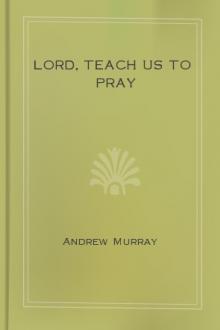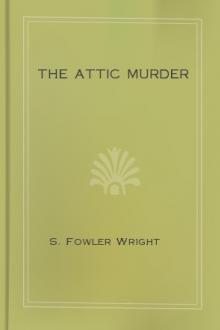Where No Fear Was, Arthur Christopher Benson [the little red hen read aloud txt] 📗

- Author: Arthur Christopher Benson
Book online «Where No Fear Was, Arthur Christopher Benson [the little red hen read aloud txt] 📗». Author Arthur Christopher Benson
We may see from all this that to attempt to seek a cure for fear in reason is foredoomed to failure, because fear lies in a region that is behind all reason. It exists in the depth of the spirit, as in the fallen gloom of the glimmering sea-deeps, and it can be touched by no activity of life and joy and sunlight on the surface, where the speeding sail moves past wind-swept headlands. We must follow it into those depths if we are to deal with it at all, and it must be vanquished in the region where it is born, and where it skulks unseen.
XII
TENNYSON, RUSKIN, CARLYLE
There were three great men of the nineteenth century of whom we know more than we know of most men, Carlyle, Ruskin, and Tennyson, in whose lives fear was a prominent element.
Tennyson has suffered no loss of fame, but he has suffered of late a certain loss of influence, which was bound to come, if simply from the tremendous domination which his writings exercised in his lifetime. He was undoubtedly one of the first word-artists who ever lived and wrote, but he was a great deal more than that; he was a great mystic, a man whose mind moved in a shining cloud of inspiration. He had the constitution and the temperament of a big Lincolnshire yeoman, with that simple rusticity that is said to have characterised Vergil. But his spirit dwelt apart, revolving dim and profound thoughts, brooding over mysteries; if he is lightly said to be Early Victorian, it is not because he was typical of his age, but because he contributed so much to make it what it was. While Browning lived an eager personal life, full of observation, zest, and passion, Tennyson abode in more impersonal thoughts. In the dawn of science, when there was a danger of life becoming over-materialised, contented with the first steps of swiftly apprehended knowledge, and with solutions which were no solutions at all, but only the perception of laws, Tennyson was the man of all others who saw that science had a deeply poetical side, and could enforce rather than destroy the religious spirit; he saw that a knowledge of processes was not the same thing as an explanation of impulses, and that while it was a little more clear in the light of science what was actually happening in the world, men were no nearer the perception of why it happened so, or why it happened at all. Tennyson saw clearly the wonders of astronomy and geology, and discerned that the laws of nature were nothing more than the habits, so to speak, of a power that was incredibly dim and vast, a power which held within itself the secrets of motion and rest, of death and life. Thus he claimed for his disciples not only the average thoughtful men, but the very best and finest minds of his generation who wished to link the past and the present together, and not to break with the old sanctities.
Tennyson's art suffered from the consciousness of his enormous responsibility, and where he failed was from his dread of unpopularity, or his fear of alienating the ordinary man. Browning was interested in ethical problems; his robust and fortunate temperament allowed him to bridge over with a sort of buoyant healthiness the gaps of his philosophy. But Tennyson's ethical failure lay in his desire to improve the occasion, and to rule out all impulses that had not a social and civic value. In the later "Idylls" he did his best to represent the prig trailing clouds of glory, and to discourage lawlessness in every form; but he was more familiar with the darker and grosser sides of life than he allowed to appear in his verse, which suffers from an almost prudish delicacy, which is more akin to respectability than to moral courage.
But all this was the shadow of a very sensitive and melancholy temperament. Comparatively little is known of the first forty years of his life; it is after that time that the elaborate legend begins. Till the time of his marriage, he must have been a constant anxiety to his friends; his gloom, his inertia, his drifting mooning ways, his hypochondria, his incapacity for any settled plan of life, all seemed to portend an ultimate failure. But this troubled inertness was the soil of his inspiration; his conceptions took slow and stately shape. He never suffered from the haste, which as Dante says "mars all decency of act." After that time he enjoyed a great domestic happiness, and practised considerable sociability. His terrifying demeanour, his amazing personal dignity and majesty, the certainty that he would say whatever came into his head, whether it was profound and solemn, or testy and discourteous, gave him a personal ascendancy that never disappointed a pilgrim.
But he lived all his life in a perpetual melancholy, feeling the smallest slights acutely, hating at once obscurity and publicity, aware of his renown, yet shrinking from the evidences of it. He could be distracted by company, soothed by wine and tobacco; but left to itself, his mind fell helplessly down the dark slope into a sadness and a dreariness which deprived life of its savour. It was not that his dread was a definite one; he was strong and tough physically, and he regarded death with a solemn curiosity; but he had a sense of the profitlessness of vacant hours, unthrilled by beauty and delight, and had also a morbid pride, of the nature of vanity, which caused him to resent the smallest criticism of his works from the humblest reader. There are many stories of this, how he declaimed against the lust of gossip, which he called with rough appositeness "ripping up a man like a pig," and thanked God with all his heart and soul that he knew nothing of Shakespeare's private life; and in the same breath went on to say that he thought that his own fame was suffering from a sort of congestion, because he had received no letters about his poems for several days.
In later life he became very pessimistic, and believed that the world was sinking fast into dull materialism, petty selfishness, and moral anarchy. He had less opportunity of knowing what was going on in the world than most people, in his sheltered and secluded life, with his court of friends and worshippers. And indeed it was not a rational pessimism; it was but the shadow of his fear. And the fact remains that in spite of a life of great good fortune, and an undimmed supremacy of fame, he spent much of his time in fighting shadows, involved in clouds of darkness and dissatisfaction. That was no doubt the price he paid for his exquisite perception of beauty and his power of melodious expression. But we make a great mistake if we merely think of Tennyson as a rich and ample nature moving serenely through life. He was "black-blooded," he once said, adding, "like all the Tennysons." Doubtless he had in his mind his father, a man often deeply in the grip of melancholy. And the absurd legend, invented probably by Rossetti, contains a truth in it and may be quoted here. Rossetti said that he once went to dine with a friend in London, and was shown into a dimly lit drawing-room with no one to receive him. He went towards the fireplace, and suddenly to his surprise discovered an immensely tall man in evening dress lying prostrate on the hearthrug, his face downwards, in an attitude of prone despair. While he gazed, the stranger rose to his feet, looked fixedly at him, and said, "I must introduce myself; I am Octavius, the most morbid of the Tennysons."
With Ruskin we have a different case. He was brought up in the most secluded fashion, and though he was sharply enough disciplined into decorous behaviour by his very grim and positive mother, he was guarded like a precious jewel, and as he grew up he was endlessly petted and indulged. The Ruskins lived a very comfortable life in a big villa with ample grounds at Denmark Hill. Whatever the wonderful boy did was applauded and even dangerously encouraged, both in the way of drawing and of writing. Though he seems to have been often publicly snubbed by both his parents, it was more a family custom than anything else, and was accompanied by undisguised admiration and patent pride. They were his stupefied critics, when he read aloud his works in the family circle, and his father obediently produced large sums of money to gratify his brilliant son's artistic desire for the possession of Turner's paintings. Ruskin in his morbid moments, in later life, turned fiercely and unjustly against his fond and tender father. He accused him with an in temperate bitterness of having lavished everything upon him except the intelligent sympathy of which he stood in need, and his father's gentle and mournful apologies have an extraordinary beauty of puzzled and patient dignity about them.
When Ruskin went to Oxford, his mother went to reside there too, to look after her darling. One might have supposed that this would have involved Ruskin in ridicule, but he was petted and indulged by his fellow-undergraduates, who found his charm, his swift wit, his childlike waywardness, his freakish humour irresistible. Then he had a serious illness, and his first taste of misery; he was afraid of death, he hated the constraints of invalid life and the grim interruption to his boundless energies and plans. Then came his first great book, and he strode full-fledged into fame. His amazing attractiveness, his talk, which combined incisiveness and fancy and humour and fire and gentleness, made him a marked figure from the first. Moreover, he had the command of great wealth, yet no temptation to be idle. The tale of Ruskin's industry for the next fifty years is one that would be incredible if it were not true. His brief and dim experience of married life seems hardly to have affected him. As a critic of art and ethics, as the writer of facile magnificent sentences, full of beauty and rhythm, as the composer of word-structures, apparently logical in form but deeply prejudiced and inconsequent in thought, he became one of the great influences of the day, and wielded not only power but real domination. The widespread delusion of the English educated classes, that they are interested in art, was of Ruskin's making. Then something very serious happened to him; a baffled passion of extraordinary intensity, a perception of the realities of life, the consciousness that his public indulged and humoured him as his parents had done, and admired his artistic advice without paying the smallest heed to his ethical principles--all these experiences broke over him, wearied as he was with excessive strain, like a bitter wave. But his pessimism took the noble form of an intense concern with the blindness and impenetrability of the world at large. He made a theory of political economy, which, peremptory and prejudiced as it is, is yet built on large lines, and has been fruitful in suggestiveness. But he tasted discouragement and failure in deep draughts. His parents frankly expressed their bewildered disappointment, his public looked upon him as a perverse man who was throwing away a beautiful message for the sake of a crabbed whim; and he fell into a fierce depression, alternating between savage energy and listless despondency, which lasted





Comments (0)